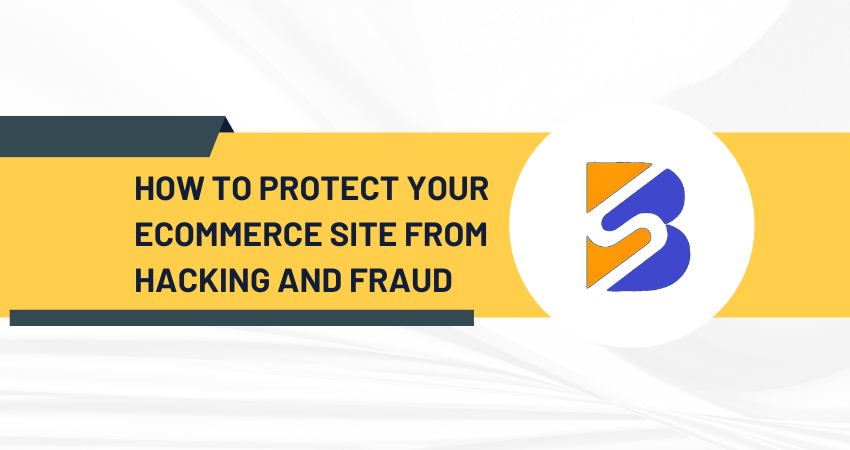Ecommerce is a booming industry, with online sales expected to reach $4.9 trillion in 2021. This growth has made ecommerce businesses a prime target for hackers and fraudsters. In 2020, ecommerce fraud losses reached $29.4 billion, and experts predict that this number will only increase in the years to come.
With the increasing importance of e-commerce for businesses, it’s crucial to partner with a reliable e-commerce development company that can help you create a secure and user-friendly online store. If you’re looking for an ecommerce development company in Ahmedabad, there are many reputable firms that can provide you with expert guidance and support to build a successful online store
Cybercriminals can exploit vulnerabilities in your e-commerce site to steal customer data and sensitive information, leading to devastating consequences for your business. In this article, we will discuss how you can protect your e-commerce site from hacking and fraud.
12 Steps to Protect Your Ecommerce Site from Hackers
Protecting your ecommerce site from hacking and fraud is critical to safeguarding your customers’ data, preserving your reputation, and ensuring the smooth functioning of your online business. Here are some essential measures you can take to enhance the security of your ecommerce site:
Use a Secure Platform
The first and foremost step to secure your e-commerce site is to use a secure platform. Choose a reputable e-commerce platform that offers security features such as SSL (Secure Sockets Layer) encryption, two-factor authentication, and security patches. These security features help protect your site from hackers and ensure that your customers’ data is safe.
Secure Your Website with SSL Encryption
SSL encryption is an essential security feature that helps protect your website from hackers. It encrypts sensitive data such as credit card numbers, passwords, and other personal information. SSL certificates are issued by trusted third-party certificate authorities, and they enable secure communication between your website and your customers’ web browsers.
Use Strong Passwords and Two-Factor Authentication
Passwords are the first line of defense against hackers. Make sure your website has a strong password policy in place, such as requiring passwords to be a minimum of eight characters long and include a mix of uppercase and lowercase letters, numbers, and special characters. Additionally, you should implement two-factor authentication, which adds an extra layer of security by requiring a second form of authentication, such as a security token or a biometric verification.
Keep Your Software Up-to-Date
Keeping your software up-to-date is crucial to protect your e-commerce site from hacking and fraud. Hackers are constantly looking for vulnerabilities in software, and outdated software can make your site an easy target. Make sure you regularly update your website’s software, including the content management system, plugins, and extensions.
Implement a Web Application Firewall (WAF)
A web application firewall (WAF) is a security tool that protects your e-commerce site from common web attacks such as SQL injection, cross-site scripting (XSS), and cross-site request forgery (CSRF). A WAF monitors and filters incoming traffic to your website, blocking malicious traffic while allowing legitimate traffic to pass through.
Use a Payment Gateway
Using a payment gateway is an essential security measure for e-commerce sites. A payment gateway is a secure service that authorizes credit card payments and processes transactions securely. It acts as a bridge between your website and the payment processor, ensuring that sensitive information such as credit card numbers is not stored on your website.
Monitor Your Site for Suspicious Activity
Monitoring your e-commerce site for suspicious activity is crucial to detecting and preventing hacking and fraud. Regularly review your website logs to identify any unusual activity, such as multiple failed login attempts or unusual spikes in traffic. You should also monitor your site for malware and viruses, which can be detected by using security software.
Educate Your Employees
Your employees play a critical role in protecting your e-commerce site from hacking and fraud. Make sure they are aware of security best practices, such as not sharing passwords, avoiding public Wi-Fi, and being vigilant for phishing scams. Additionally, provide regular training to your employees on how to identify and prevent hacking and fraud.
Use Captcha and Anti-Spam Tools
Captcha and anti-spam tools are effective security measures that help prevent automated attacks such as spam and bot attacks. Captcha is a tool that requires users to solve a challenge to prove that they are human, while anti-spam tools use filters to block spam messages and prevent bots from accessing your website.
Backup Your Data Regularly
Backing up your data is crucial to protect your e-commerce site from data loss and to ensure business continuity in the event of a cyberattack or other unexpected event. Regularly backup your website’s data, including customer data and other critical information, and store it in a secure offsite location.
Implement Access Controls
Access controls are essential security measures that help protect your e-commerce site from unauthorized access. Implement access controls to restrict access to sensitive data and functions, such as the ability to modify prices or add new products. This helps prevent accidental or malicious changes that could harm your business.
Use Verified Third-Party Services
Using verified third-party services can also help protect your e-commerce site from hacking and fraud. For example, using a reputable shipping service can help ensure that your customers receive their orders securely and on time. Additionally, using a trusted payment processor and fraud detection service can help protect your business from fraudulent transactions.
Here are some additional tips for protecting your ecommerce site from hacking and fraud:
- Use a secure hosting provider. A secure hosting provider will have measures in place to protect your website from attack.
- Use a content delivery network (CDN). A CDN can help protect your website from DDoS attacks.
- Back up your website regularly. This will help you restore your website if it is hacked or becomes unavailable.
- Monitor your website traffic. This will help you identify any suspicious activity.
- Stay up-to-date on the latest cybersecurity threats. This will help you protect your website from the latest attacks.
In conclusion, protecting your e-commerce site from hacking and fraud is crucial to the success of your business. By following the above tips and implementing a comprehensive security strategy, you can help ensure the safety and security of your website, customer data, and business operations. Remember to regularly monitor your site for suspicious activity, keep your software up-to-date, use strong passwords and two-factor authentication, and educate your employees on security best practices. By taking a proactive approach to security, you can help protect your business from the devastating consequences of hacking and fraud.



